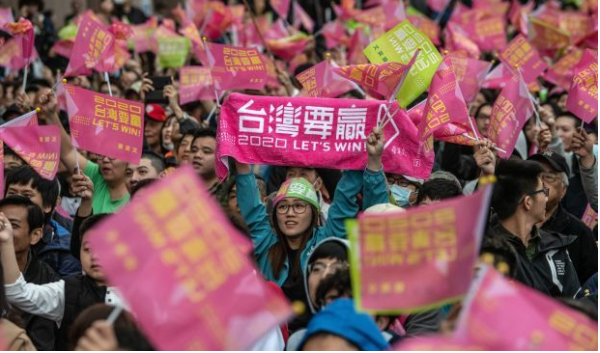There’s little doubt that Beijing’s Taiwan strategy isn’t working, but it just doesn’t want to hear about it.
The landslide victory of president Tsai Ing-wen in last weekend’s (Jan. 11) election had been forecast by pollsters and analysts for months, citing in particular growing fears among voters that Taiwan could end up like Hong Kong if it did not stand up against China’s growing encroachment.
People went for a president who was steadfast in her support of the Hong Kong protests and in her rejection of closer ties with Beijing at the expense of Taiwan’s freedom, unlike Tsai’s opponent Han Kuo-yu of the Kuomintang party, who pushed for closer ties with China, even though
Beijing effectively cut off ties with Taipei following Tsai’s election in 2016.
In Hong Kong, many have joked Tsai should thank Chinese leader Xi Jinping and Hong Kong chief Carrie Lam for her victory, as the government’s unresponsiveness to protest demands, along with aggressive policing, tarnished the “one country, two systems” model Beijing had
hoped Taiwan could accept.
However, Taiwan has been heading in this direction for years. Surveys consistently show that more and more of its people identify only as Taiwanese, and not as Chinese, particularly among the younger generation.
The Hong Kong protests have only amplified those trends. Those who support outright independence have also been growing. China claims Taiwan as its own territory and sees unification with Taiwan as a historical inevitability, and has repeatedly threatened to use force to that end if
needed. The Chinese Communist Party has never ruled over Taiwan.
Like the local elections in Hong Kong in November which saw pro-democracy forces also win by a landslide, it appears that Beijing was blindsided once again. As in the case of Hong Kong, Beijing either once again misread the public mood, or was receiving inaccurate intelligence, possibly
by officials reluctant to state the truth to leaders at the top of the party.
As such, Beijing has reached for the usual scapegoats to explain how its preferred candidate lost. State news agency Xinhua, for example, accused Tsai (link in Chinese) of using “dirty tactics” including vote-buying, misinformation campaigns online, and intimidation to garner votes,
calling the overall operation “green terror” in reference to the color representing Tsai’s camp. It also blamed “dark forces” for the result, without elaborating. Nationalist tabloid Global Times said Tsai “wantonly hyped up” the threat from China to influence the election.
Xinhua also mentioned that “Western political forces” manipulated the election amid a time of heightening US-China tensions, and accused countries of using the Hong Kong issue to “fan the flames” and “mislead Taiwanese people.” The foreign ministry castigated the dozens of
countries who offered their congratulations to Tsai, including the US and Japan, accusing them of violating the “One China” principle, or the belief that Taiwan and China are part of the same country. Wang Yi, the country’s foreign minister, also said that those who split the country will
“leave a stink for 10,000 years.”
The pronouncements from Beijing and its mouthpieces echo those that have been made with regards to the Hong Kong protests, with officials frequently resorting to blaming foreign forces for the unrest. The strategy generally plays well to its nationalistic domestic audience, many of
whom see no room for compromise on the question of Taiwanese sovereignty and accept the Beijing government’s propaganda.
Still, some Chinese citizens observed Tsai’s record election win and saw holes in the propaganda. Among the comments below a Global Times post about the Taiwan election on social network Weibo, for example, one said that the election result showed that the tabloid was “fooling itself,”
while others pointed out that something must be wrong with Beijing’s Taiwan strategy if the goal of unification seems to be increasingly distant. In a similar vein, some Weibo users also expressed confusion when the Hong Kong government withdrew the extradition bill that first provoked
the city’s protests, wondering why the authorities responded to the protesters’ demand when they had been fed propaganda all along painting them as thugs backed by the CIA and other forces.



